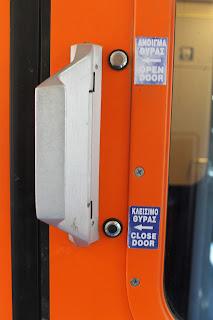The refugee
camps in mainland Greece have gradually been improved since the current crisis surged
in 2015. The Greek Government has reorganized them, reshuffled people, put people
temporarily in hotels, closed camps, opened camps and generally tried to manage
the situation, or behaved capriciously, depending on how you look at it. The camps on the Islands are another subject
altogether, I’m told, but I have no experience of those.
On my first
day back to work in Thessaloniki after a four-day break with a respiratory infection,
I visited one of the mainland camps. As I was driving fellow volunteers Ken and Bro out to Sinatex camp, a place
where they’d been teaching English and - mostly, I suspect – organizing soccer
games for some time, Bro’s phone rang: “Oh,” he reported to us, “The camp’s closing
tomorrow”. Great, I thought, I just get
assigned to something and it changes. But, after all, what’s so new about that
in this volunteer game? Variety is the spice, they say, of life.
The looming closure
of the camp had been on the cards, but we’d expected a few days’ notice – and so had
the refugees who lived there. But no, they’d only just been told, so when we
arrived they were busy packing up to move next day.
We’d planned
to give English lessons that afternoon, but we found ourselves without students, language
lessons not being high priority in view of the impending move.
Ken quickly organized a well-supported soccer game: apparently that was a priority. Bro had brought his own
guitar and two others to share so he launched into a three-hour lesson/jam
session with some Kurdish men. It was difficult to pry him loose at the end of the day! I was left to
find something useful to do. The trusty coloring pages and crayons in my
backpack came into play as I rounded up a number of young children and staked out a
corner of a bleak empty room where we sat on the concrete floor to amuse ourselves. Three unplanned hours with a dozen small children can be a long time!
We cut, colored, jumped rope, played running games and
even danced the Hokey Cokey, which apparently everyone in the world knows!
But those
few hours could be my only experience of Sinatex Camp, for it is no more.
And, i n my case,
I didn’t give it enough time for consistency to develop. In the five days I worked
there I was assigned to five different places, each of them about 45 minutes
away in various directions, mostly by public transportation. I spent one day sorting clothes at the warehouse; one day
helping organize children’s activities at Intervolve, a well-equipped education center for female
refugees; one afternoon at Sinatex camp and two days in two different kitchens helping
to cook food and distribute it to homeless refugees.
 |
| At Sinatex, about a hundred refugees, mostly Kurdish I believe, lived in compartments inside an empty industrial building |
 |
| Soccer game beside the camp. I guess someone just missed a goal. |
 |
| Social center just outside the camp. This is where English lessons and children's activities had usually been held. Its fate was unknown when I visited. |
 |
| And there was a playground - all now abandoned |
The
organization I was working for in Thessaloniki has no projects of its own. It’s a labor pool,
supplying volunteers to other NGOs as needed.
So any one volunteer might find herself working for a variety of
different projects, one day at a time. Over several days or weeks, of course, you might be consistently
assigned to one particular project or type of project, depending on your
skills. And once you’d learned the ropes somewhere, you’d be more useful in
that place, so a certain amount of regularity would set in. But this system requires a lot of careful organization and leads to a lot of last-minute changes.
 |
| Volunteers cleaned and chopped vegetables, cooked them with rice, pasta, lentils or beans, and packed up about 60 meals twice a day. |
 |
| An abandoned multi-story car park, one of the buildings where homeless people live. |
 |
| DocMobile joined us at the food distribution site - a very dirty empty lot - to tackle health issues. |
 |
| Nurse Susan examined a patient in an ad hoc privacy shelter. |
 |
| We left a dozen meals at this place. We saw no one come to claim them, but apparently they're picked up every day, |











